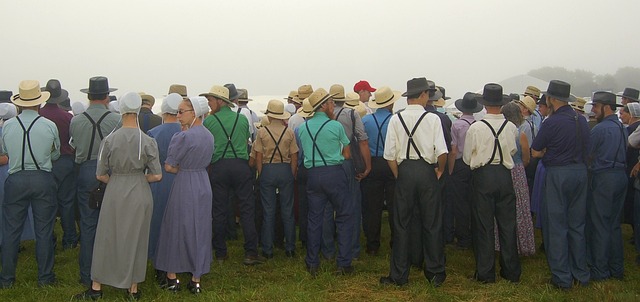The Amish community places a strong emphasis on family and the value of children. Pregnancy is generally viewed as a blessing and a natural part of life within the Amish culture.
Table of Contents
The Importance of Pregnancy in Amish Culture
Pregnancy holds a significant place in Amish culture, as it is seen as a blessing and a vital part of their way of life. The Amish community places great importance on the role of women as mothers and the continuation of their heritage through the birth of children. In this article, we will explore how the Amish feel about pregnancy and the various aspects that make it such a cherished event in their lives.
For the Amish, pregnancy is not just a personal matter but a communal one. The entire community comes together to support and celebrate the expectant mother. From the moment a woman announces her pregnancy, she is surrounded by a network of family, friends, and neighbors who offer their assistance and guidance. This support system ensures that the mother-to-be feels loved and cared for throughout her pregnancy journey.
The Amish believe that children are a gift from God and that each new life is a blessing. They view pregnancy as a natural and beautiful process that should be embraced and cherished. The anticipation of a new addition to the family brings joy and excitement to the entire community. It is not uncommon for the expectant mother to receive gifts and well-wishes from her loved ones, further reinforcing the sense of unity and togetherness within the Amish community.
During pregnancy, Amish women are encouraged to prioritize their health and well-being. They are advised to eat nutritious meals, get plenty of rest, and avoid any activities that may put their health or the health of their unborn child at risk. The community rallies around the expectant mother, offering assistance with household chores, childcare, and other responsibilities to ensure she can focus on her own well-being and that of her baby.
Childbirth is considered a natural process in Amish culture, and home births are the norm. Midwives, who are experienced women within the community, play a crucial role in assisting with the delivery. They provide emotional support, guidance, and medical expertise to ensure a safe and comfortable birth experience. The presence of family members and close friends during childbirth is also encouraged, creating a warm and intimate environment for the mother and her newborn.
After the birth of a child, the Amish community continues to provide support to the new mother. Meals are prepared and delivered to the family, and neighbors offer their assistance with household chores and caring for older siblings. This communal effort allows the mother to recover and bond with her newborn without the added stress of daily responsibilities.
The Amish also have a unique approach to family planning. While they do not use modern contraceptives, they believe in leaving the number of children they have in God’s hands. They trust that God will provide for each child and that their family size is part of His plan. This belief in divine providence shapes their perspective on pregnancy and reinforces the importance they place on each new life.
In conclusion, pregnancy holds immense significance in Amish culture. It is a time of celebration, support, and unity within the community. The Amish view pregnancy as a blessing and a natural process that should be embraced and cherished. From the moment a woman announces her pregnancy to the birth of her child, the Amish community surrounds her with love, assistance, and guidance. Pregnancy is not just a personal journey for an Amish woman but a communal one, reinforcing the strong bonds and values that define their way of life.
Traditional Practices and Beliefs Surrounding Pregnancy in the Amish Community

The Amish community is known for its traditional practices and beliefs, which extend to all aspects of life, including pregnancy. In the Amish culture, pregnancy is viewed as a blessing and a natural part of life. It is seen as a time of joy and anticipation, as a new life is being brought into the world. The Amish have a deep respect for the sanctity of life and believe that each child is a gift from God.
One of the key beliefs surrounding pregnancy in the Amish community is the importance of family. The Amish value large families and see children as a blessing. They believe that it is their duty to procreate and raise their children in a loving and nurturing environment. This belief is deeply rooted in their faith and is reflected in their attitudes towards pregnancy.
The Amish also have a strong belief in the importance of community support during pregnancy. When a woman becomes pregnant, she is surrounded by her family and the wider Amish community. They offer support, guidance, and assistance throughout the entire pregnancy journey. This support network helps to alleviate any worries or concerns that the expectant mother may have and ensures that she feels loved and cared for during this special time.
In the Amish community, pregnancy is seen as a natural process that should be embraced and celebrated. The Amish do not typically use modern medical interventions during pregnancy and childbirth. Instead, they rely on natural remedies and traditional practices. They believe that the body is designed to give birth and that it is best to let nature take its course.
During pregnancy, Amish women often continue with their daily activities and responsibilities. They may continue to work on the farm, care for their other children, and participate in community activities. This active lifestyle is seen as beneficial for both the mother and the baby. It helps to keep the expectant mother physically fit and mentally engaged, which is believed to contribute to a healthy pregnancy.
The Amish also have specific customs and traditions surrounding childbirth. Home births are common in the Amish community, with midwives playing a crucial role in the delivery process. Midwives are experienced women within the community who have extensive knowledge of childbirth and provide support and guidance to the expectant mother.
After the birth, the Amish community comes together to celebrate the new arrival. Friends and family members visit the new parents, bringing gifts and offering their congratulations. This sense of community support continues long after the birth, with the Amish community providing assistance and guidance as the new parents navigate the challenges of raising a child.
In conclusion, the Amish community holds pregnancy in high regard and views it as a sacred and joyous time. They value large families and believe in the importance of community support during pregnancy. The Amish rely on natural remedies and traditional practices, embracing the belief that the body is designed to give birth. Pregnancy is seen as a natural process that should be celebrated and cherished, and the Amish community comes together to support and celebrate new life.
The Role of Family and Community Support During Amish Pregnancies
The Amish community is known for its strong emphasis on family and community values. These values are deeply ingrained in every aspect of their lives, including pregnancy. For the Amish, pregnancy is not just a personal journey but a communal one as well. The role of family and community support during Amish pregnancies is crucial, and it plays a significant part in shaping the overall experience for expectant mothers.
In the Amish community, pregnancy is seen as a blessing and a gift from God. It is a time of great joy and anticipation for both the parents and the extended family. From the moment a woman discovers she is pregnant, she is surrounded by love and support from her family and the wider community. This support begins with the announcement of the pregnancy, which is often made during a church service or a family gathering. The news is met with excitement and congratulations, and the expectant mother is showered with well wishes and prayers.
Throughout the pregnancy, the expectant mother receives constant support from her family and community. Her immediate family, including her husband, parents, and siblings, are always there to lend a helping hand. They assist with household chores, childcare, and any other tasks that may become challenging for the expectant mother as her pregnancy progresses. This support ensures that she can focus on her health and the well-being of her unborn child.
The Amish community also plays a vital role in supporting expectant mothers. The women in the community, especially those who have experienced pregnancy themselves, offer guidance and advice to the expectant mother. They share their wisdom on various aspects of pregnancy, such as nutrition, prenatal care, and childbirth. This exchange of knowledge helps the expectant mother feel more confident and prepared for the journey ahead.
In addition to the emotional and practical support, the Amish community also provides financial assistance to expectant mothers. The cost of prenatal care and childbirth can be significant, and the community recognizes the importance of ensuring that every expectant mother receives the care she needs. Fundraisers and community events are organized to raise money for medical expenses, baby supplies, and other necessities. This collective effort ensures that no expectant mother is left without the resources she requires.
The Amish community’s involvement in pregnancy does not end with childbirth. After the baby is born, the support continues. The extended family and community members rally around the new parents, offering help with childcare, household chores, and any other needs that may arise. This support allows the new parents to adjust to their new roles and responsibilities while knowing that they have a strong support system behind them.
In conclusion, the Amish community places great importance on family and community support during pregnancies. From the moment a woman discovers she is pregnant, she is surrounded by love, guidance, and practical assistance. This support extends throughout the pregnancy and continues after the baby is born. The Amish community’s commitment to supporting expectant mothers ensures that they have a positive and empowering experience during this special time in their lives.
Exploring Amish Perspectives on Childbirth and Parenting
The Amish community is known for its traditional way of life, which includes a strong emphasis on family and community. When it comes to pregnancy, the Amish have their own unique perspectives and practices. Let’s take a closer look at how the Amish feel about pregnancy and the role it plays in their lives.
For the Amish, pregnancy is seen as a blessing and a natural part of life. They believe that children are a gift from God and that it is their duty to bring them into the world. Pregnancy is viewed as a sacred and joyous time, filled with anticipation and excitement. The Amish value large families and see children as a blessing that brings joy and fulfillment to their lives.
Unlike in mainstream society, where pregnancy is often seen as a medical condition, the Amish view it as a normal and healthy process. They believe in the body’s ability to naturally conceive, carry, and deliver a child. As a result, they tend to have a more hands-off approach to prenatal care and childbirth. Instead of relying heavily on medical interventions, the Amish often turn to traditional remedies and natural methods to support a healthy pregnancy.
During pregnancy, Amish women receive support and guidance from their families and the community. They are encouraged to take care of themselves and their growing baby by eating nutritious foods, getting plenty of rest, and avoiding harmful substances. The Amish community also provides emotional support to expectant mothers, offering prayers and assistance with household chores and childcare.
When it comes to childbirth, the Amish prefer home births attended by a midwife or a trusted female family member. They believe that giving birth at home allows for a more intimate and natural experience. The presence of loved ones during labor and delivery provides comfort and encouragement to the mother. The Amish also believe that home births promote bonding between the mother and the newborn, as well as a smoother transition into family life.
After the birth of a child, the Amish community rallies around the new parents, offering practical help and support. Family members and neighbors often pitch in with household chores, cooking meals, and caring for older siblings. This communal approach to parenting allows the new parents to focus on bonding with their baby and adjusting to their new role.
Breastfeeding is highly encouraged in the Amish community, as it is seen as the most natural and healthy way to nourish a baby. Amish women often breastfeed their babies for an extended period, sometimes up to two years or more. They believe that breastfeeding provides the best nutrition for the baby and strengthens the bond between mother and child.
In conclusion, the Amish have a deep respect for pregnancy and childbirth. They view it as a sacred and natural process, embracing the joy and challenges that come with bringing a new life into the world. The Amish rely on their faith, community support, and traditional practices to navigate the journey of pregnancy and parenting. Their emphasis on family and communal living creates a nurturing environment for both the mother and the child, ensuring a strong foundation for a lifetime of love and care.
Conclusion
The Amish generally view pregnancy as a blessing and a natural part of life. They value large families and consider children to be a gift from God.
For licensing reasons, we must provide the following notice: This content was created in part with the help of an AI.


